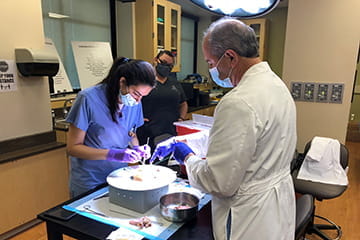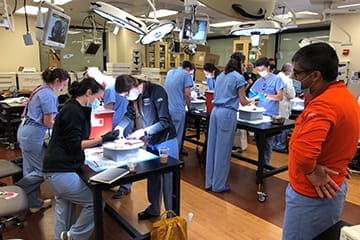The Six-Year Integrated Cardiothoracic Surgery Residency program at Indiana University School of Medicine is for those individuals who wish to pursue cardiothoracic surgical training directly after graduation from medical school. The program accepts one resident per academic year, offering either a Cardiac Track or Thoracic Track depending on interests. Clinical rotations and formal educational curriculum are executed in tandem with residents in the traditional residency program. These clinical experiences are obtained at the following major clinical sites: IU Health Methodist Hospital, University Hospital, Riley Hospital for Children and the Roudebush VA Medical Center.
Precision training and education

Regardless of track, the resident is exposed to all subspecialties with the same educational goals, expectations and responsibilities. The difference is that the designated track allows for more time spent rotating in the desired specialty during the final year, which includes discretion on elective rotations. The first two to three years of the program consist of requisite core surgical education. These include rotations in general surgery, laparoscopic surgery, surgical oncology, vascular surgery, pediatric surgery, surgical intensive/ critical care, trauma, abdominal transplant surgery, general thoracic surgery, interventional cardiology, cardiac anesthesia and adult cardiac surgery.
Questions?
For questions about the program or application process, please contact the Residency Program Director, Jeremy Herrmann, MD or the Residency Program Coordinator, Cherron Jones.
Surgical decision-making

The fourth through sixth years are comprised of focused cardiothoracic surgical training, with rotations in adult cardiac surgery, general thoracic surgery and pediatric/ congenital cardiothoracic surgery. There is an emphasis on progressive autonomy in clinical and surgical decision-making as the resident’s abilities grow. The program culminates in a chief resident year, when the resident will be expected to lead and manage clinical services and teams. During this final year, there is discretion on elective rotations which allow for more time spent in the desired subspecialty based on training track and clinical interests.
The clinical training is supplemented by multiple formal educational activities throughout the year, including weekly didactic conferences, board examination reviews, surgical skills simulation sessions and mock oral examinations.
Apply
All applications must be received through the Electronic Residency Application (ERAS) program. Minimum requirements for applications are as follows:
- ERAS® application with photo
- Letters of recommendation (three minimum), one of which must come from either a surgery program chair or surgery program director.
- Dean’s letter or USMLE (Step 1 and Step 2 CK) scores or Medical Student Performance Evaluation
- Medical student transcripts
- Personal statement of eligibility to obtain medical licensure by the state of Indiana
- Graduates of a non-US medical school must also include an Educational Commission for Foreign Medical Graduates (ECFMG) certificate
Qualified applicants will be offered an invitation to interview. Applicant interviews are held November through December.